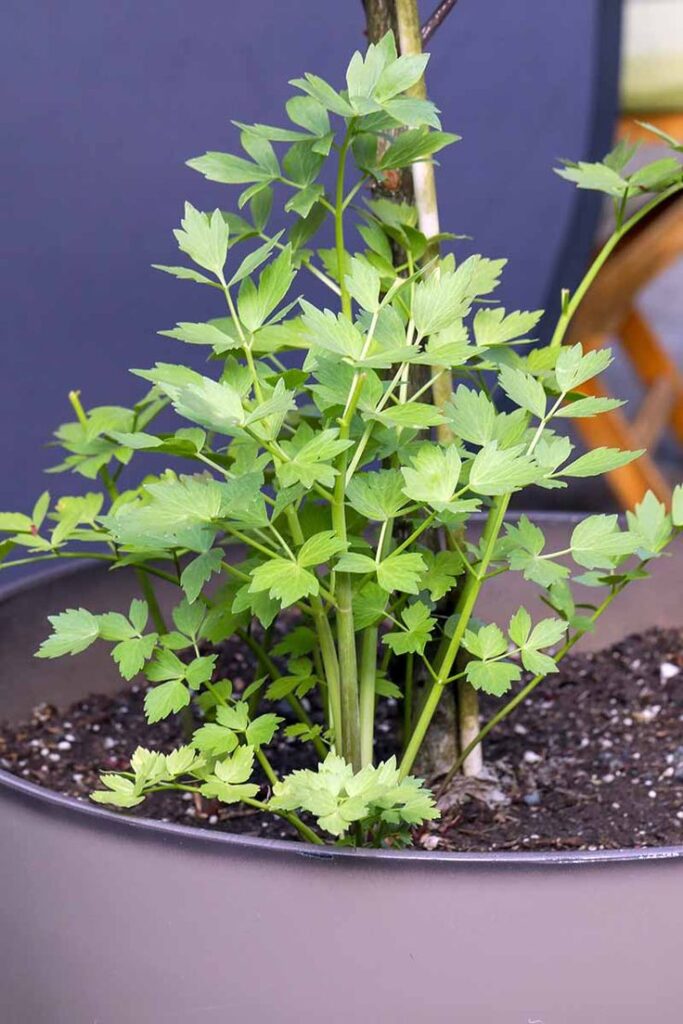Lovage is a hardy perennial that has no natural enemies and can grow lushly.
Growing it is not difficult, provided you overcome the initial difficulties that may come with planting.
Here are the most common problems and top tips for growing lovage:
Buy seeds from reliable breeders.
– Plant the seeds in the garden or in a pot. Soak the seeds in water for two to three hours and fertilize the soil before sowing.
– A good way to grow is to use garden soil mixed with potting soil.
Lovage doesn’t like clay or limestone soils and requires well-drained, slightly compacted soil. This is one of the necessary conditions for successful cultivation.

Another secret is the right time for sowing: in the fall, from late October to mid-November, or in the spring.
Lovage is a highly resistant plant to pests and diseases, but it is delicate and fragile during the first few months of its growth period. If you plant it in the garden, protect the small plants with aluminum foil or tarpaulin until the end of April or even mid-May if the nights are very cold.
– Lovage needs sun, but prefers morning light and indirect light, which is found in shady and damp areas of the garden.
Replanting in a very sunny location can be fatal for the plant. Remember to protect it from midday sun.
Medicinal Properties of Lovage
Lovage, or grandmother’s secret spice, is known for its many flavors and unique aroma.
Its taste is initially sweet, then bitter at the end. That’s why our grandmothers always had it on hand and couldn’t do without it in the preparation of their favorite dishes.
Lovage for Health:
Not only is it a spice that adds flavor to your dishes, it’s also a very beneficial plant for health. It has a beneficial effect on the urinary tract – it relieves painful inflammation and has a diuretic effect.
In addition, it promotes the production of enzymes that aid digestion, accelerate metabolism and prevent flatulence.

Lovage can protect the body from inflammation that causes joint disease. In addition to its beneficial effects on the urinary tract, it is also an excellent aid for prostate hypertrophy, and its scent has a relaxing and restorative effect. It also improves circulation and helps with rheumatism and gallbladder complications.
It was used to make various aromatic infusions, extracts and even baths.
Promote proper lung function
Traditional medicine uses lovage to reduce mucus in the lungs, which improves breathing and oxygen exchange in the body.
Lovage contains essential oils that help relieve lung irritation and improve overall health in just 4 days of use.
Promotes joint health
Lovage is considered a natural remedy to support joint health and relieve joint pain. It has no side effects.
Relieves allergies
The calming effect of lovage naturally helps combat allergy symptoms. Quercetin, one of its compounds, inhibits histamine release and reduces irritation caused by hypersensitivity to certain allergens.
10 Benefits of Lovage for Health:
– Promotes digestion, if you are trying to lose weight, it is the best help,
– Accelerates metabolism,
– Promotes bile secretion – Prevention of gallbladder diseases,
– Eliminates flatulence,

– Prevention of cardiovascular diseases, cleaning of blood vessels,
– Diuretic effect – excellent for people who suffer from frequent inflammation of the bladder, kidneys and excretory system,
– Removes excess water from the body – if you eat a lot of salt, lovage cleanses the body of excess sodium,
– Cleanses the respiratory tract – removes mucus and makes breathing easier,
Lovage extract successfully combats joint diseases such as rheumatism, osteoarthritis, and gout. You can boil any part of the plant, but the root has the greatest effect. A herbal tea made from lovage root can effectively relieve many health problems.
Lovage is excellent for treating flu and is not only an excellent prophylactic but also enables a faster recovery.
Lovage at Home:
Grandmothers used lovage not only in sauces, soups, or meat. Its leaves—dried or fresh—were stored in cupboards and pantries, where they acted as a pest repellent.
Use all parts.
Lovage roots can be dried, ground, and used as a spice in dishes. The leaves and stems can be added to broths, salads, and sauces. Young leaves add an aromatic celery flavor to dishes.
The leaves can be dried and used to make spices, aromatic salts and oils.
The leaves can be harvested throughout the season. The lovage root is only harvested in the third year after summer. We dry the root and grind it into a spice.
How do you cultivate it?
Only 1-2 plants are needed, and they grow very quickly.
The perfect time to sow lovage in the garden is March or April at the latest. Seeds for direct sowing can be found at all garden centers.
The second option is to propagate the plant by cuttings (simply plant the cuttings in the soil and let them take root). You can also buy cuttings and plant them in the garden—this is also the easiest option.
Lovage is very hardy and can therefore easily be overwintered in the garden.
Medicinal lovage tea:
1 teaspoon of chopped leaves are boiled in 250 ml of water for 10 minutes.
This recipe is beneficial for inflammation of the urinary tract and also has a detoxifying effect after excessive alcohol or nicotine consumption.


